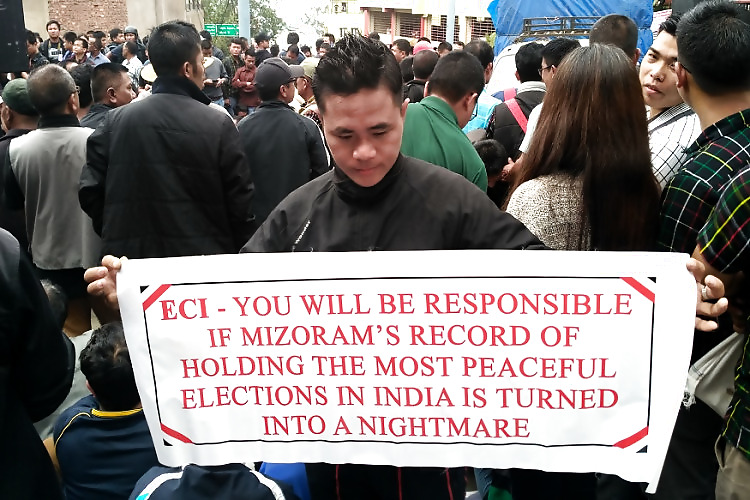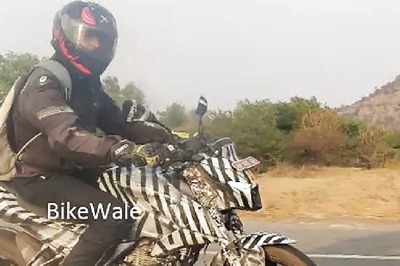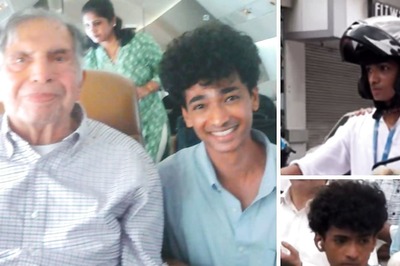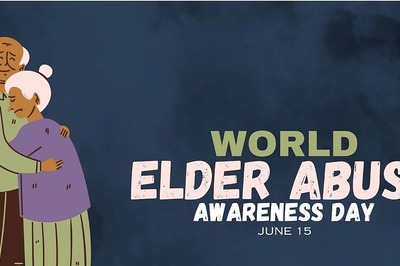Bru Refugees, BJP Poll Gimmick and a Transfer: The Underlying Reason For Massive Protests in Mizoram

views
The massive protests that took place across Mizoram earlier this week to demand the removal of Chief Electoral Officer SB Shashank have plunged the ongoing electioneering process into a hiatus.
A quick reaction from the Election Commission, which summoned the CEO to New Delhi on Tuesday for a meeting, has led to protests being called off for now as organisers of the protests say they will wait and watch what the poll panel does.
At least 43,000 people had turned out in capital Aizawl alone on Monday – the first and most widespread day of the protests – to sing, pray and chant together outside the CEO’s office. Similar protests were organised in at least seven large towns, mostly outside the offices of their respective district election officers.
Even the Federation of Mizoram Government Employees and Workers threatened that unless Shashank is removed by November 9, they will begin a non-cooperation movement.
The protests were organized by the NGO Coordination Committee, which is made up of three community-based organizations - Young Mizo Association, the Mizoram Senior Citizens' Association and the Mizo Women's Federation - along with two student unions - the Mizo Students' Association and the Mizo Students' Union.
The trigger for the demonstrations was the Election Commission’s decision to transfer out of Mizoram the principal secretary for home and finance Lalnunmawia Chuaungo following a letter by CEO Shashank which said he was interfering in the election process.
There were several reasons for the protests. Firstly, the Mizo groups felt Chuaungo had not been really given the chance to explain himself after Shashank's allegations.
Given that there is already a dearth of senior all-India civil service officers from the community and Shashank is seen as a junior officer, the NGOs immediately sided with Chuaungo. They declared Shahshank ‘unfit’ to conduct free and fair elections.
But the underlying reasons for the protests had plenty to do with what has been simmering in Mizoram's electoral politics for decades - Bru tribals living in the relief camps of Tripura.
A large population of the Bru community in western Mizoram left for Tripura in 1997, following the ethnic conflict that was set off by the murder of a Mizo official by a Bru militant group.
Note: It is another matter that a large number of Brus did stay behind and continue, till today, to live in Mizoram, many in the same villages as Mizos. As of now, there are over 32,000 Brus in relief camps, while an estimated 40,000 Brus live within four districts of Mizoram.
In several past elections in Mizoram, Brus living in the relief camps have cast their votes from Tripura, either through postal ballots or some other special arrangement.
However, there is strong suspicion among Mizo groups that the casting of votes from within Tripura has plenty of scope for money and muscle power to be misused.
There are various reasons for this suspicion, one notable example being that there have been instances in which candidates with little or no political background and with hardly any assets have been able to corner a large majority of the votes cast in the relief camps but fell far short of the same in normal polling stations.
Since Brus have been living in the relief camps for over 20 years, Mizo groups also feel they don't really have an electoral stake anymore in Mizoram. What lends strength to this opinion is that since 2010, the Ministry of Home Affairs and the governments of Tripura and Mizoram have been organising repatriation processes to bring these relief camp inmates back to Mizoram.
But these have always been less than successful and less than 9,000 people have taken part, mainly due to protests and additional demands concerning rehabilitation packages.
The series of unsuccessful repatriation attempts has prompted even the home ministry to announce this year that a final repatriation attempt be made and, after that, the relief camps would be closed and rations stopped.
The ministry followed through on its schedule and after October 1, by which time the eighth repatriation process had concluded with just over 30 families returning, rations were stopped with immediate effect.
However, hardly a week had elapsed when the rations were restarted and elected officials from BJP-ruled Tripura went to the relief camps to kick-start the dole-out of rations again. This obviously led to strong suspicions that there was a political gimmick behind the entire exercise, especially so close to polls.

The massive protests come just two weeks left before the state goes to polls.
It is in the backdrop of all these developments that Chuaungo's transfer took place. There had been obvious disagreements between him and Shashank before, one having to do with differing opinions on the validity of what are called identification slips, issued to Bru relief camp inmates back in 2016 to identify those who (or at least their immediate relatives) lived in Mizoram before the events of 1997.
Another was the theft of election related forms from the Mamit DEOs office and, as the EC said in its letter, the subsequent investigation. Another was the deployment of Central Armed Paramilitary Forces for the elections, which turned out to the immediate cause of Chuaungo's transfer.
But besides the bureaucratic tussle, NGOs also contended that the e-roll revision in the camps was conducted in ways that are less than ideal, and that forms were simply given to the camp leaders and sent back to Mizoram.
And then came the ECI's commitment back in 2014 saying Brus will vote within Mizoram for any future state assembly as well as parliamentary elections. The ECI, many in Mizoram suspected, was less than keen to stick to the commitment, with local newspapers reporting that the ECI in its press conference did not apparently plan to stand by its commitment.
It remains to be seen how that plays out eventually and the ECI has sent a second team to Mizoram, due to arrive Friday, to flesh out all outstanding issues but suspicions remain deeply rooted.
Besides all this, another obvious aspect of the protests is the effect it has had on the electioneering, which had been going on for quite some time with many candidates having already filed their nominations. The protests have temporarily halted the process, with people generally not talking about the political events of the past few months.
The Congress has been ruling in Mizoram for 10 years, and the Mizo National Front is the principal opposition. A new outfit has also emerged from the forging together of seven local parties, while a former corruption-watchdog has also joined the fray. Apart from all this, the BJP has been trying to enter in a big way, despite its consistent poor showing in earlier polls, attempting to occupy the region's last Congress stronghold.
What we have seen in the past few months is that the Congress has lost no less than five of its top leaders, mainly due to ticket distribution but also because of other reasons.
These include the then Congress vice-president R Lalzirliana, the then Assembly Speaker Hiphei, a former Cabinet Minister Lalrinliana Sailo, a former MoS Dr B D Chakma and a former Parliamentary Secretay Hmingdailova Khiangte.
This has obviously led to the loss of some morale within the party and at the same time has also enthused the Mizo National Front, who felt the Congress is in decline internally and felt it was their chance after a decade out of power.
But it will be interesting to see how parties pick up the pieces from here on, with roughly two and a half weeks to go before polling.
Another interesting aspect is that the BJP, which has declared that Mizoram is their last agenda in the North East, has taken a major battering on social media. Mizos are extremely active on social media and penetration is extremely high.
There is a lot of suspicion, rightly or wrongly and partly egged on by Congress workers, that the BJP has played a role in the various events that gave the protests such a big push, particularly concerning the Bru relief camps.
It hasn't helped the MNF either that is part of the North East Democratic Alliance, a "non-electoral" alliance headed by the BJP for the "development" of the region and convened by the BJP's election-in-charge of Mizoram, Himanta Biswa Sarma.
(Adam Saprinsanga is the editor of the Frontier Despatch. Views expressed in the article are his own).


















Comments
0 comment